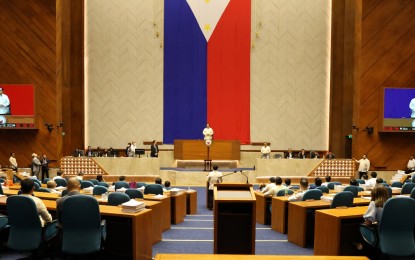
House session hall (Photo courtesy of Office of Speaker Romualdez)
MANILA – Two measures that would incorporate climate proofing in building codes took a major step toward becoming law on Wednesday after lawmakers at the House of Representatives voted to approve the bills on final reading.
During the plenary session, a total of 266 lawmakers voted to approve House Bill (HB) 8500, which contains the country’s proposed new National Building Code or law. No lawmaker voted against the bill or abstained from voting.
House Bill 8500, or the proposed “New Philippine Building Act," aims to protect the public against multiple hazards like fire, weather disturbances and earthquake.
Speaker Martin Romualdez said the present building code, embodied in Presidential Decree 1096, was enacted on Feb. 19, 1977, or more than 46 years ago by the late former President Ferdinand Marcos Sr.
“Many developments in building standards and technologies, climate change, and disaster risk reduction and management have since taken place. It’s time that we update our law under the second Marcos administration,” he said.
The proposed law would set “minimum standards for the regulation of location, planning, design, construction, occupancy, maintenance, and demolition of buildings.”
"A single life or structure we can save is more than worth the time, money, and effort we have put in keeping our building law abreast with best practices and regulations," he added.
The bill would allow local government units (LGUs) to pass their own building ordinances, provided these are consistent with the proposed new building law.
It mandates that the construction of structures that straddle LGUs shall be harmonized.
The measure provides for the classification of buildings, including residential, business, commercial/mercantile, educational, agricultural, institutional, factory/industrial, storage, utilities and high-hazard.
It prescribes the construction standards and requirements for each category.
The secretary of the Department of Public Works and Highways shall be designated as National Building Official and serve as chief implementer of the proposed law.
With 266 affirmative votes, the chamber also approved HB 8569, which would require a Tree Planting Plan (TPP) from all applicants of building permits for residential, commercial, industrial and public building development projects.
The proposal aims to help mitigate the effects of climate change and environmental degradation.
“In requiring a Tree Planting Plan (TPP) to secure building permits, we aim to enhance environmental quality, mitigate the effects of climate change and preserve the environment for present and future generations,” Romualdez said.
Under the bill, any person, firm, corporation, department, office, bureau, agency or instrumentality of the government intending to construct, alter, repair or convert any building or structure, is required to set aside, and properly maintain in said property, areas adequate for planting and maintaining trees and flora.
The proposed legislation particularly gives preference to indigenous species of trees, taking into account the location, climate, and topography of the area. (PNA)
